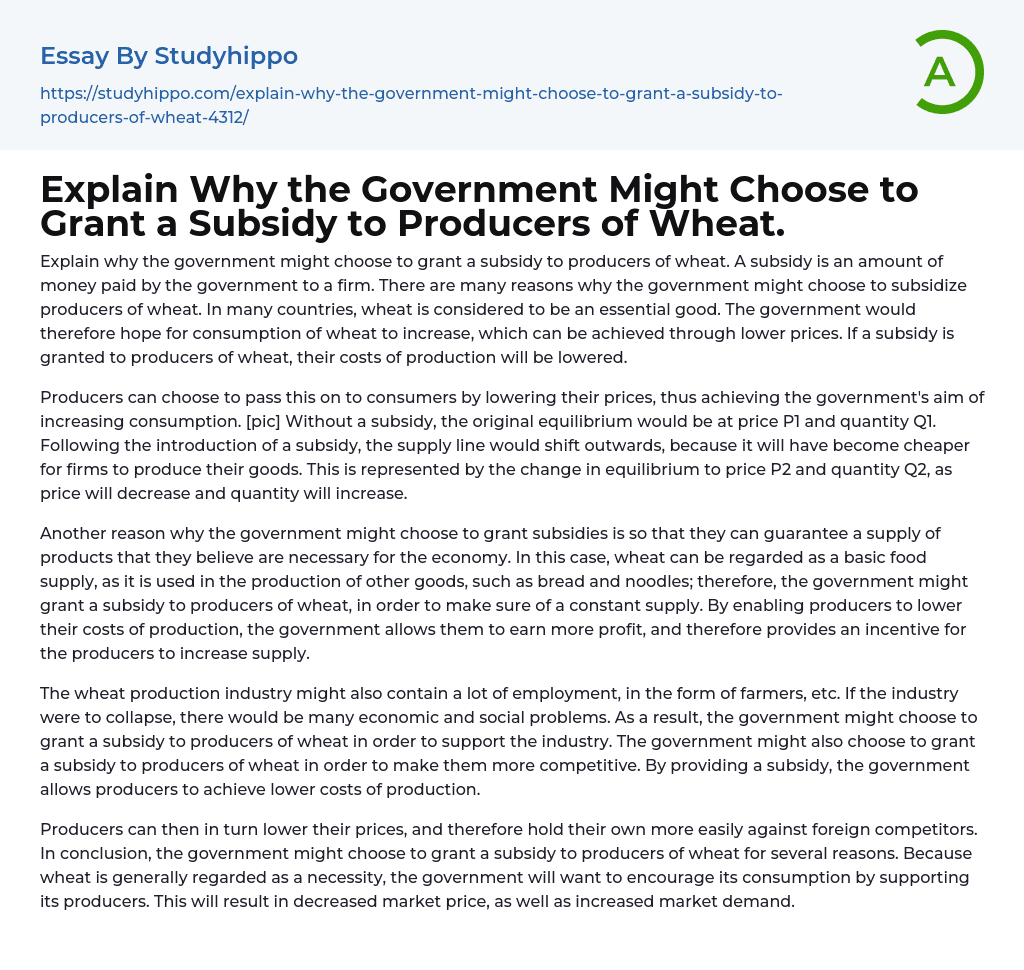

Explain Why the Government Might Choose to Grant a Subsidy to Producers of Wheat. Essay Example
Explain why the government might choose to grant a subsidy to producers of wheat. A subsidy is an amount of money paid by the government to a firm. There are many reasons why the government might choose to subsidize producers of wheat. In many countries, wheat is considered to be an essential good. The government would therefore hope for consumption of wheat to increase, which can be achieved through lower prices. If a subsidy is granted to producers of wheat, their costs of production will be lowered.
Producers can choose to pass this on to consumers by lowering their prices, thus achieving the government's aim of increasing consumption. [pic] Without a subsidy, the original equilibrium would be at price P1 and quantity Q1. Following the introduction of a subsidy, the supply line would shift outwards, because it wi
...ll have become cheaper for firms to produce their goods. This is represented by the change in equilibrium to price P2 and quantity Q2, as price will decrease and quantity will increase.
Another reason why the government might choose to grant subsidies is so that they can guarantee a supply of products that they believe are necessary for the economy. In this case, wheat can be regarded as a basic food supply, as it is used in the production of other goods, such as bread and noodles; therefore, the government might grant a subsidy to producers of wheat, in order to make sure of a constant supply. By enabling producers to lower their costs of production, the government allows them to earn more profit, and therefore provides an incentive for the producers to increase supply.
The wheat production industry might also
contain a lot of employment, in the form of farmers, etc. If the industry were to collapse, there would be many economic and social problems. As a result, the government might choose to grant a subsidy to producers of wheat in order to support the industry. The government might also choose to grant a subsidy to producers of wheat in order to make them more competitive. By providing a subsidy, the government allows producers to achieve lower costs of production.
Producers can then in turn lower their prices, and therefore hold their own more easily against foreign competitors. In conclusion, the government might choose to grant a subsidy to producers of wheat for several reasons. Because wheat is generally regarded as a necessity, the government will want to encourage its consumption by supporting its producers. This will result in decreased market price, as well as increased market demand.
- Federal government essays
- Armed Forces essays
- Confederate States Of America essays
- Federal Government Of The United States essays
- Fourteenth Amendment To The United States Constitution essays
- Governance essays
- Parliament essays
- Politics essays
- Jurisdiction essays
- Bureaucracy essays
- Separation Of Powers essays
- Congress essays
- President essays
- United States Congress essays
- Non-Commissioned Officer essays
- Appeal essays
- Revenge essays
- Corporate Governance essays
- Public Service essays
- Income Tax essays
- Supply essays
- Red Cross essays
- Democracy essays
- State essays
- Liberty essays
- Absolutism essays
- Reform essays
- Republic essays
- John Marshall essays
- Bourgeoisie essays
- Developed Country essays
- Elections essays
- International Relations essays
- Left-Wing Politics essays
- Monarchy essays
- Political Corruption essays
- Political Party essays
- Political Science essays
- Sovereign State essays
- United Nations essays
- World Trade Organization essays
- Contras essays
- Dictatorship essays
- Foreign policy essays
- Monarch essays
- Corruption essays
- Foreign essays
- Democratic Party essays
- European Union essays
- President Of The United States essays



